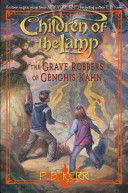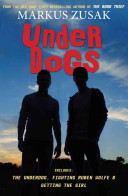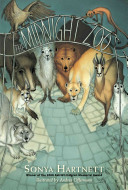
While volcanoes spew golden lava around the world, djinn twins John and Philippa, with their parents, Uncle Nimrod, and Groanin, face evil more powerful than ever before when they try to stop the wicked djinn trying to rob the grave of Genghis Khan.

While volcanoes spew golden lava around the world, djinn twins John and Philippa, with their parents, Uncle Nimrod, and Groanin, face evil more powerful than ever before when they try to stop the wicked djinn trying to rob the grave of Genghis Khan.

Markus Zusak wrote a trilogy of gritty, funny, and at times heart-breaking novels about the Wolfe brothers: THE UNDERDOG, FIGHTING RUBEN WOLFE, and GETTING THE GIRL. These novels are presented in one volume for the first time. Cameron and Ruben Wolfe are champions at getting into fights, coming up with half-baked schemes, and generally disappointing girls, their parents, and their much more motivated older siblings. They’re intensely loyal to each other, brothers at their best and at their very worst. But when Cameron falls head over heels for Ruben’s girlfriend, the strength of their bond is tested to its breaking point.

Twelve-year-old Andrej, nine-year-old Tomas, and their baby sister Wilma flee their Romany encampment when it is attacked by Germans during World War II, and in an abandoned town they find a zoo where the animals tell their stories, helping the children understand what has become of their lives and what it means to be free.
In Victorian London, impoverished fifteen-year-old orphan Grace takes care of her older but mentally unfit sister Lily, and after enduring many harsh and painful experiences, the two become the victims of a fraud perpetrated by the wealthy owners of several funeral businesses.
The last of the pharaohs before the beginning of the Common Era, Cleopatra ascended the throne at age eighteen following the death of her father. Charming as well as smart and ambitious, she made two Roman leaders fall madly in love with her. Her greatest challenge was not her kingdom but her own sisters, blinded by their ambition. The tale of her teenage years is a story of power and romance that stands the test of time—centuries later, Cleopatra remains a figure of mystery and intrigue.
From Ireland’s first laureate for children’s literature comes a story of abuse and neglect told with sincerity, heart, and a healthy dose of humor. Jono has always been able to cope with his mother’s drinking, but when she hits his little sister Julie, he decides it’s time for them to run away. Told in Jono’s funny, self-conscious voice, the layers of his past and the events of his escape are gradually revealed.
Sin’s world is turned upside down when she has to ally with a demon and his brother to save her beloved Goblin Market from the evil magicians.
Kate Banks’s lyrical poetry pairs with Gabi Swiatkowska’s playful dreamlike images to create this must-have book for all children who are about to be new siblings. While Mama’s busy knitting a wardrobe for her unborn baby, big sister is preparing in her own way: imagining, asking, wondering what this baby will like. As the seasons pass, this baby grows, too–and soon big sister will have the answers to all of her questions.
Saba has spent her whole life in Silverlake, a dried-up wasteland ravaged by constant sandstorms. The Wrecker civilization has long been destroyed, leaving only landfills for Saba and her family to scavenge from. That’s fine by her, as long as her beloved twin brother Lugh is around. But when a monster sandstorm arrives, along with four cloaked horsemen, Saba’s world is shattered. Lugh is captured, and Saba embarks on an epic quest to get him back.
Suddenly thrown into the lawless, ugly reality of the world outside of desolate Silverlake, Saba is lost without Lugh to guide her. So perhaps the most surprising thing of all is what Saba learns about herself: she’s a fierce fighter, an unbeatable survivor, and a cunning opponent. And she has the power to take down a corrupt society from the inside. Teamed up with a handsome daredevil named Jack and a gang of girl revolutionaries called the Free Hawks, Saba stages a showdown that will change the course of her own civilization.